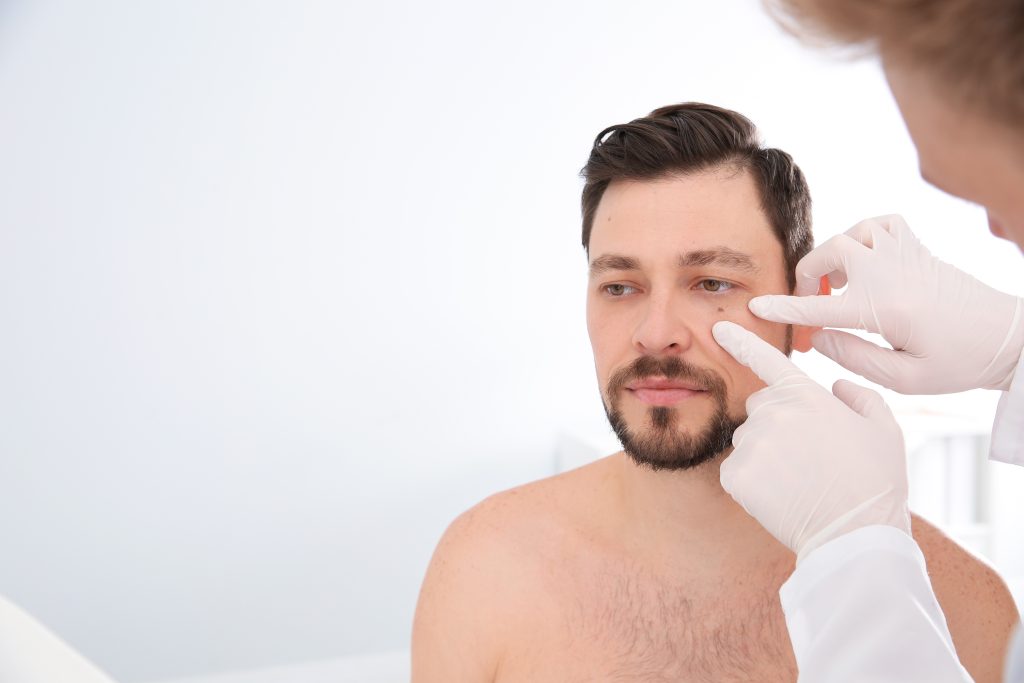
The holiday season is upon us, and amidst all the hustle and bustle, it’s essential to take a moment to consider the gift of health. This Christmas, why not take a moment to give yourself something truly meaningful? In this blog, we are not talking about gifts that can be wrapped in wrapping paper and ribbons; instead, this type of present is something a bit more holistic in nature. It’s something you can give yourself and encourage others to give themselves too. What are we referring to? Skin exams! As another year comes to an end and we reflect on all our blessings, it’s important to take some time out for self-care and proactive health measures.
What is a Skin Exam?
A skin exam is a thorough examination of the skin, hair, and nails conducted by a dermatology professional to assess, diagnose, and monitor skin conditions, diseases, and concerns.
Here’s an overview of what typically happens during a skin exam:
- Medical History: The dermatologist will start by taking a detailed medical history, asking about any skin conditions, family history of skin diseases, medications, allergies, and other relevant information.
- Visual Inspection: The dermatologist will visually inspect the skin, hair, and nails for any abnormalities, such as moles, growths, rashes, discolorations, or other lesions.
- Mole Mapping: In some cases, especially if the patient has a history of skin cancer or numerous moles, the dermatologist may create a mole map. This involves documenting the location, size, and characteristics of each mole to monitor changes over time.
- Biopsy: If the dermatologist identifies any suspicious lesions or growths, they may recommend a biopsy. During a biopsy, a small sample of the tissue is taken for further examination under a microscope to determine if it is cancerous or benign.
- Education and Recommendations: The dermatologist may provide education about proper skin care and sun protection, and they may recommend specific treatments or interventions based on their findings.
Why Are Skin Exams Important?
Regular skin exams are important for the early detection of skin conditions, including skin cancer. Skin cancer is the most common cancer in the U.S. and research suggests that 1 in 5 Americans will develop skin cancer during their lifetime. Approximately 9,500 people are diagnosed with skin cancer every day. *
Anyone can develop skin cancer, regardless of skin color. The most common cause of cancerous changes is exposure to harmful ultraviolet radiation from the sun and artificial tanning beds. The sun’s ultraviolet rays damage the DNA in your skin cells and lead to cell mutation and formation of malignant tumors.
The positive news is that with early identification and diagnosis, skin cancer is highly treatable. If cancerous changes are detected in the early stages, treatment has a much higher likelihood of being effective. This is the primary reason why performing regular skin checks on yourself and getting an annual skin exam are important and proactive steps you can take to protect your skin and prevent cancerous growths from worsening.
Many dermatologists recommend you examine your skin from top to bottom once a month and get a skin exam from a licensed dermatology professional once a year. Regular examinations are even more crucial if you are at high risk due to a compromised immune system, a personal history of skin cancer or a family history of skin cancer.
Tips for Performing a Self-Exam
You know the normal patterns of your moles, freckles, birthmarks, and other skin blemishes best, which makes you the best person to detect new or unusual changes when they occur. When performing a skin self-exam, take note of new moles, spots, sores, growths, or lesions. Keep track of spots that change in size or color, as well as spots that bleed, itch, ooze and don’t heal after a few weeks. If you notice anything new or unusual during an exam, contact your dermatologist and make an appointment to have it checked out by a professional.
Here are some tips you can follow when examining yourself:
- Perform the self-exam in a well-lit room in front of a full-length mirror. Have a few hand mirrors nearby to help you reach hard-to-see places.
- Check everywhere, even areas of your skin that don’t receive much sun exposure. Start by using the full-length mirror to examine your skin from the front, back and along each side of your body with your arms raised. Check your face, lips, and the front of your ears. Check the forearm and underarm of each arm, as well as the shins and calves of each leg. If you’re a woman, lift each breast to examine the undersides.
- Use hand mirrors to view hard-to-see places like the back of the neck, behind the ears, the backs of the thighs, the knee creases, the buttocks, and the genital region. Use a hand mirror combined with a blow dryer or comb to examine your scalp.
- Don’t forget the small places. Check under fingernails and toenails, between fingers and toes, the palms of the hands and the soles of the feet.
- For extremely hard-to-see places – like your back and scalp – ask a partner or friend for help examining these areas.
Become familiar with what’s normal and what’s not for your skin – be the biggest advocate for your own health if you notice a new or unusual change.
Schedule an Annual Skin Exam with a Professional
No two individuals have the exact same skin, and what works for one may not work for another. Annual skin exams allow dermatologists to assess your unique skin type, identifying specific needs and challenges. This personalized approach ensures that your skin care routine is tailored to promote optimal health. Regular exams help establish a baseline for your skin’s health, making it easier to identify deviations that may require attention.
Annual skin exams are not just a precautionary measure; they are a gift to your future self. By prioritizing the health of your skin, you’re taking a crucial step toward overall well-being. Schedule an appointment with a dermatologist and let the annual skin exam become a cornerstone of your commitment to a healthier, happier you. Your skin deserves the attention, and your future self will thank you for it.
Make an Appointment with Florida Dermatology and Skin Cancer Centers
Along with completing your own skin self-exams at home, you should make an appointment with your dermatologist for a skin check once a year. FLDSCC currently has several convenient locations across the state of Florida – find the office location closest to you and call us to book your appointment!


